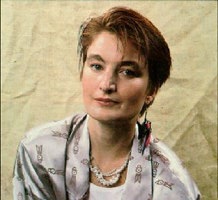

NEWBEATS:
Jane Siberry, Canadian Woman
from Creem magazine, Oct 1986
by Laura Fissinger
 The guy's about 45, a classic born-and-bred New Yawk City street tough,
and a publisher of music magazines more likely to feature Motley Crue
than anyone like 30-year-old Canadian composer/performer Jane Siberry.
But after Siberry's "coming out" concert in Manhattan, all his
usual swagger evaporates.
The guy's about 45, a classic born-and-bred New Yawk City street tough,
and a publisher of music magazines more likely to feature Motley Crue
than anyone like 30-year-old Canadian composer/performer Jane Siberry.
But after Siberry's "coming out" concert in Manhattan, all his
usual swagger evaporates.
"Are you going back there to say hello to her?" His face and voice are vulnerable, anxious. "You just gotta tell her, you've just gotta -- she's the most sensitive person I've ever seen. She's...she's..." Finally he can't say any more. "She's a mystery."
Yes, Jane Siberry is a mystery. But there are clues.
Clue one: She grew up in the suburbs of Toronto. Formal piano lessons were ditched early; the real learning on piano and guitar was done by ear and instinct. And away from the instruments: "I wasn't a cheerleader, but I wasn't a bookworm, either. I guess I was a sort of normal cigarettes, drugs and boys type."
Clue two: She laughs. A laugh that floats like chiffon, a grin that makes her slanted eyes almost disappear into her cheekbones.
Clue three: "I did a lot of living in my head during my adolescence. Yeah, I was lonely, but it was being lonely for myself."
Clue four: She studied music for a while in college, but switched quickly to sciences. "Music is me, it's my life force" -- but science, ah, science was this fabulous, weird knot of mysteries crammed with formulas and orders that would come together and make sparks and create a whole new set of mysteries. Jane got one degree in science and one in microbiology.
Clue five: "When I was studying physics, I used to read Harlequin Romance books on the side." A giggle. "Heroes? People I admire? Well, Einstein, of course, but everyone loves Albert Einstein don't they? And Monty Python, too. Albert Einstein and Monty Python."
Clue six: After college, Jane didn't get a science job. She worked the Canadian folkie circuit, waitressing to pay the bills. "I could never remember drink orders." Waitressing money paid for her first album in 1981, a homegrown effort called "Jane Siberry." Thousands of people make kitchen-sink albums every year, and mostly they vanish into the great vinyl abyss. Siberry's record and growing reputation from live performances got her a Canadian record deal and the chance to make a weird and more-or-less wonderful album in 1984 called "No Borders Here."
Clue seven: Ants make anthills, journalists make comparisons. Siberry's like Laurie Anderson, they said. Lots of synthesizer, lots of talking mixed in with the singing, lots of droll, obtuse verbal riddles in the lyrics. Kate Bush, they said. Lots of gorgeous melodies and emotional riptides but too complicated for radio-land. Joni Mitchell, they said, because of vocal harmonies pretty enough to make a brick wall cry. And almost every article on Siberry calls her eccentric. If I read that word about you one more time, a reporter said to Jane, I'll -- "barf?" offered Jane with her chiffon laugh.
Clue eight: "I guess I believe everyone's eccentric." Siberry says this sitting in the corporate offices of one of America's biggest record labels, which has decided to throw its considerable weight behind Jane's third LP, "Speckless Sky." The woman couldn't write a three-minute hit single at gunpoint, but, somewhere in the offices of the big guns, it's been decided that doesn't matter. There's this mystery, this magic, and maybe it will break Siberry through to the fringes of hitsville. "Everyone is eccentric, really, and if you can spend some time with them, and find out what's special and charming about them, you'll see it. Maybe I am eccentric -- I just try to walk a middle line." A twinkle in the slanted eyes.
Clue nine: And when Siberry's on a concert stage, her lines shoot out to each audience member from the very first song, and coil around them until the show ends two fascinating, confusing hours later. And unlike so many people who make complicated music, Siberry and her band spend most of the two hours smiling, laughing, and looking as if they were kids who'd just been told that the big bad world was not going to squash their imaginations, ever. That's the Siberry mystery: how did she get to 30 years old and not get squashed? "Just tell her for me," the street-tough magazine publisher sighed, "-- just tell her I love her."